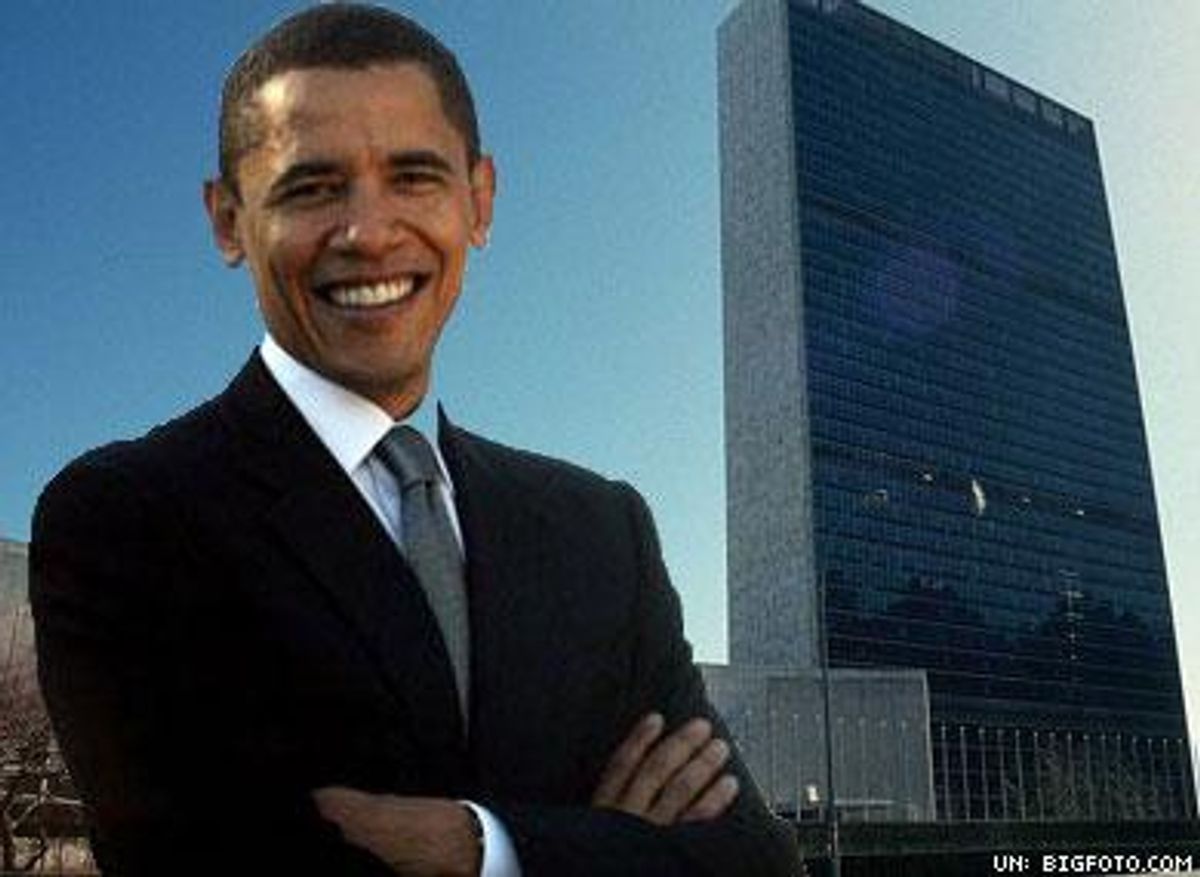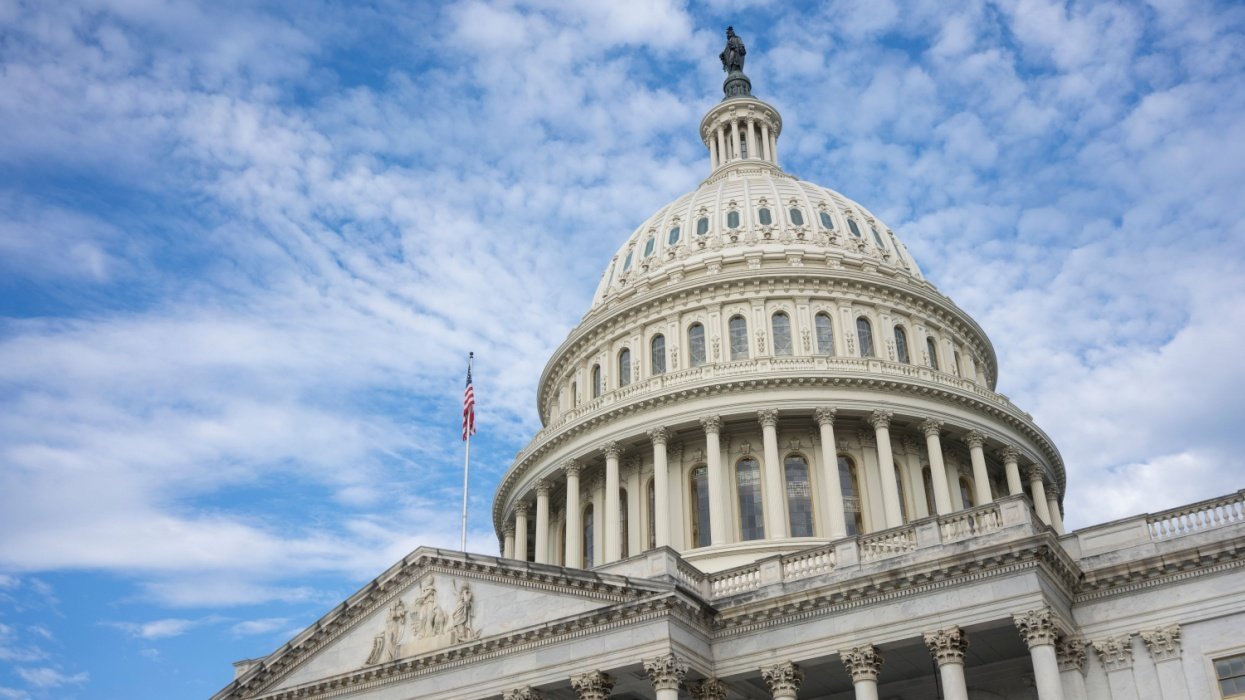The hosannas are flying
in response to
news
that the United States will sign onto a United Nations General
Assembly declaration urging all of its member states to
decriminalize homosexuality. "The Administration's leadership
on this issue is a rebuke of an earlier Bush administration
position that sought to deny the universal application of human
rights protections to lesbian, gay, bisexual, and transgender
individuals,"
said Mark Bromley
of the Council for Global Equality. Joe Solmonese of the Human
Rights Campaign
applauded
the State Department's decision as "a welcome step forward as
it signals to the world that, after years of a hostile
administration, the United States recognizes the humanity of
lesbian, gay, bisexual, and transgender people at home and
abroad."
The decision by the
Obama administration to support the French-drafted statement
and thereby join 66 other countries in denouncing
government-endorsed homophobia represents a welcome reversal
from the policies of its predecessor. In December the Bush
administration refused to sign the decree, citing the bogus
rationale that the declaration's legal stipulations would
impinge on the ability of state governments to legislate on
matters of sexual orientation-based discrimination (in most
states it remains legal to fire someone because of their
sexuality). While the statement is sponsored by a diverse set
of democratic nations ranging from the entire European Union to
Israel and Japan, it is opposed, naturally, by a motley crew of
Muslim states, African dictatorships, and the authoritarian
behemoths of China and Russia. Those governments signed onto a
rival declaration drafted by Syria stating that the resolution
would "usher into social normalization, and possibly the
legitimization, of many deplorable acts, including
pedophilia." With this laudable turnaround, the United States
finds itself not only on the right side of a fundamental human
rights issue but in pleasant and proper company.
This auspicious move by
the new administration, however, carries the danger of lulling
gay rights activists into a sense of complacency. International
homophobia is something so entrenched that mere statements
protesting it will have little to no effect in mitigating its
horrendous consequences. While the decision of the Obama
administration marks a welcome change in American foreign
policy, it is ultimately a hollow victory.
That such a progressive
statement would emerge from the United Nations is unusual. Ever
since its establishment in 1945, the U.N. has been little more
than a money pit and a propaganda platform for the world's
worst human rights abusers. Throughout most of its existence,
the U.N. was a sideshow to the larger drama of the Cold War.
The Soviet Union and its satellites routinely denounced
American "imperialism" and very little was achieved in
forwarding the cause of international peace, the reason for the
U.N.'s creation. Although the superpower rivalry is long over,
the U.N. still functions mainly as a way for global
Lilliputians to tie down the American Gulliver.
One need only look to
the other resolutions passed by the United Nations General
Assembly to see just how futile are the organization's diktats.
The body regularly calls for the end of racism, poverty,
hunger, genocide, and war, among other blights on mankind, as
if publishing a resolution on overpriced letterhead is enough
to solve problems intrinsic to human existence. And because the
General Assembly has no actual power aside from the issuance of
pieces of paper expressing its feelings about various and
sundry matters, the gravity of its resolutions can only be
measured by the bravado of the language contained therein.
According to the
sponsors of the French resolution, homosexuality is illegal in
nearly 80 countries and the punishment often includes a death
sentence. In some places, homophobia is deeply ingrained in the
culture, but in many others is a prejudice employed by
illiberal regimes to suppress dissent, instill fear in the
populace, and exercise ultimate control over society. Iran, for
instance, has a rich history of homosexual relations, whatever
the absurd attempts of its president to deny its existence, and
there is little evidence to suggest that the Iranian people
themselves support the murderously antigay policies of the
mullahs who rule over their lives. As in every other nation
unfortunate enough to live under the boot of religious fascists
or authoritarians, U.N. resolutions condemning state-sponsored
homophobia will not save the gays of Iran. Regime change
will.
Focusing so much
attention on toothless U.N. resolutions misses the forest for
the trees. Over the next few years, the Obama administration
will be confronted with many decisions carrying far greater
consequences than whatever effect its decision to append our
name to this document might have. For instance, will the United
States allow Iran to go nuclear? What sort of political
arrangement will we leave behind in Iraq? The answer to these
questions matters far more than anything the United Nations
will ever do.
The wrong lesson to
draw from this move would be to consider it momentous evidence
of the Administration's commitment to gay rights. Obama's
reversing Bush administration policy was a cost-free decision
that angered only far-right conservatives who never supported
him nor had any intention of doing so. The president will face
more important tests on the domestic front in the upcoming
years -- like revoking "don't ask, don't tell" and
the Defense of Marriage Act, bestowing federal recognition of
gay unions, and passing the Employment Non-Discrimination Act,
for instance -- all of which carry long-term consequences.
So, yes, let's
celebrate the long-overdue decision by our government to stand
on the right side of history. Let's do what we can to ensure
that this declaration has some appreciable effect on the
miserable lives led by so many gay people around the world. But
let's not forget that righteous statements cannot be a
substitute for action.

















































































